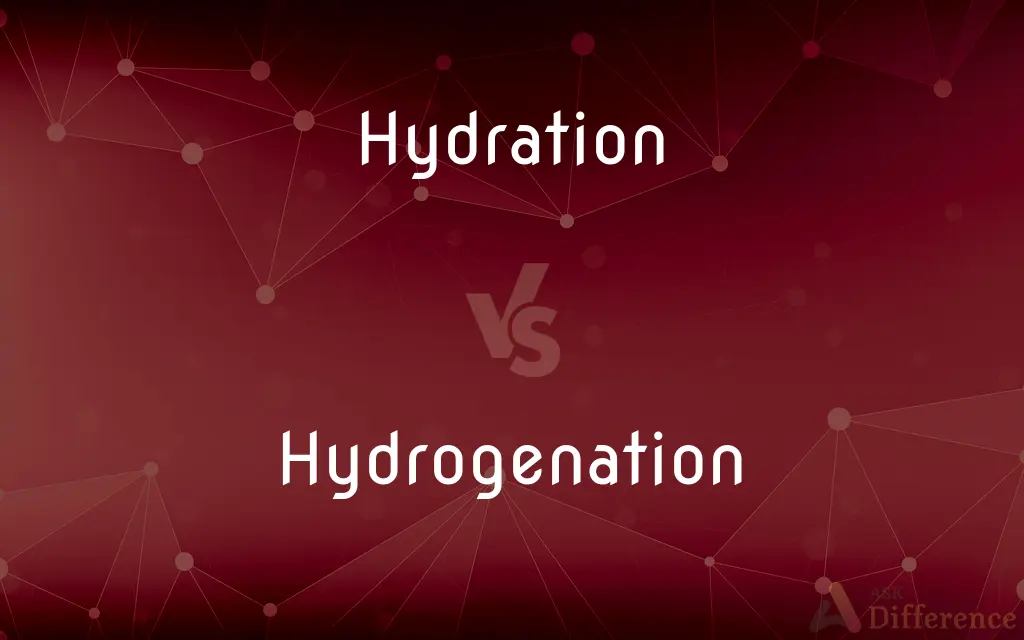Hydration vs. Hydrogenation — What's the Difference?
By Maham Liaqat & Fiza Rafique — Updated on April 15, 2024
Hydration involves the process of adding water to a substance, crucial for many biological and chemical reactions, while hydrogenation is the addition of hydrogen to unsaturated bonds in molecules, often used in food processing to solidify oils.

Difference Between Hydration and Hydrogenation
Table of Contents
ADVERTISEMENT
Key Differences
Hydration refers to the process of introducing water to various substances, significantly affecting biological systems and chemical reactions. On the other hand, hydrogenation specifically involves the addition of hydrogen atoms to double or triple bonds within chemical structures, primarily in organic chemistry and industrial applications.
In biology, hydration is essential for cellular functions and overall organism health, impacting everything from enzyme activity to physical performance. Whereas hydrogenation is a chemical reaction that alters the physical and chemical properties of substances, such as converting vegetable oils into semi-solid forms for margarine production.
Chemically, hydration can influence the solubility and reactivity of compounds, facilitating reactions like hydrolysis or the formation of hydrates. On the other hand, hydrogenation is used to reduce or saturate organic compounds, often to stabilize them or alter their melting points for industrial uses.
Hydration is a critical component in the preparation and properties of materials like cement and plaster, where water is necessary for the chemical set and hardening. In contrast, hydrogenation is key in the food industry to change the consistency of fats and oils, affecting texture, shelf life, and flavor stability.
In terms of environmental impact, improper hydration practices can lead to issues like waterlogging and soil degradation. Conversely, hydrogenation processes, particularly those using metals as catalysts, raise concerns about environmental pollution and the sustainability of catalyst sourcing.
ADVERTISEMENT
Comparison Chart
Definition
Adding water to a substance
Adding hydrogen to unsaturated bonds
Key Uses
Biological processes, chemical reactions, material preparation
Industrial applications, food processing, organic synthesis
Impact
Affects solubility, enzyme activity, and physical properties
Alters physical properties like melting points, stabilizes compounds
Environmental Concerns
Potential for water misuse and ecosystem impact
Catalyst use and potential pollution
Example
Hydrating cement for construction
Hydrogenating oils to produce margarine
Compare with Definitions
Hydration
Necessary in the preparation of construction materials.
The hydration of cement is a key step in setting concrete.
Hydrogenation
A chemical reaction where hydrogen is added to other molecules.
Hydrogenation of edible oils results in margarine.
Hydration
The process of combining water with another substance.
Hydration of lime is crucial in the production of plaster.
Hydrogenation
Affects the melting point and stability of substances.
Hydrogenation is used to stabilize fats for longer shelf life.
Hydration
Involves water as a key component.
Hydration reactions are vital in both biological and chemical systems.
Hydrogenation
Often requires a catalyst like nickel.
The hydrogenation process typically uses nickel to facilitate the reaction.
Hydration
Crucial for maintaining biological functions.
Proper hydration is essential for optimal physical performance.
Hydrogenation
Used to solidify liquid oils in food processing.
Hydrogenation changes unsaturated fats to saturated fats, improving spreadability.
Hydration
Can affect chemical solubility and reaction rates.
Hydration is important in the dissolution and reaction of electrolytes.
Hydrogenation
Has industrial and synthetic applications.
Hydrogenation reactions are common in creating specialized chemical compounds.
Hydration
A solid compound containing water molecules combined in a definite ratio as an integral part of the crystal. Often used in combination
Pentahydrate.
Hydrogenation
Hydrogenation is a chemical reaction between molecular hydrogen (H2) and another compound or element, usually in the presence of a catalyst such as nickel, palladium or platinum. The process is commonly employed to reduce or saturate organic compounds.
Hydration
To rehydrate.
Hydrogenation
(chemistry) The chemical reaction of hydrogen with another substance, especially with an unsaturated organic compound, and usually under the influence of temperature, pressure and catalysts.
Hydration
To supply water to (a person, for example) in order to restore or maintain fluid balance
"Cold water is the fastest and safest way to hydrate an ordinary athlete" (Jane E. Brody).
Hydrogenation
The act of combining with hydrogen, or the state of being so combined.
Hydration
To become a hydrate.
Hydrogenation
A chemical process that adds hydrogen atoms to an unsaturated oil;
Food producers use hydrogenation to keep fat from becoming rancid
Hydration
(chemistry) The incorporation of water molecules into a complex with those of another compound.
Hydration
(biology) The process of providing an adequate amount of water to body tissues.
Hydration
(construction) The chemical reaction by which a substance (such as cement) combines with water, giving off heat to form a crystalline structure in its setting and hardening.
Hydration
The act of becoming, or state of being, a hydrate.
Hydration
The process of combining with water; usually reversible
Common Curiosities
How does hydrogenation affect food products?
Hydrogenation converts unsaturated fats to saturated fats, impacting the texture, stability, and shelf life of food products.
What industries use hydrogenation extensively?
The food industry uses hydrogenation extensively to modify fats and oils, and it is also significant in chemical manufacturing for producing certain polymers and alcohols.
How does hydration influence health?
Proper hydration is essential for maintaining fluid balance, supporting cellular functions, and improving physical and cognitive performance.
Can hydration occur in all types of substances?
Hydration can occur in many substances where water molecules can integrate or react, such as in hydrates or solutions.
What role does hydration play in sports?
In sports, hydration is critical for maintaining endurance, preventing heat stress, and ensuring optimal muscle function.
Why is hydration important in construction?
Hydration is crucial in construction for materials like cement and plaster, where it triggers the chemical hardening necessary for structural integrity.
Is hydrogenation reversible?
Hydrogenation is generally not reversible through simple means; reversing it often requires complex processes like dehydrogenation.
What is the primary purpose of hydration?
The primary purpose of hydration is to add water to substances, influencing biological functions and chemical reactions.
What are the environmental concerns with hydrogenation?
Hydrogenation can involve toxic catalysts and contribute to environmental pollution through industrial waste.
What is a hydration reaction in chemistry?
A hydration reaction in chemistry involves water molecules adding to a substrate, often changing the compound’s structure and properties.
Does hydration speed up chemical reactions?
Hydration can speed up chemical reactions by facilitating the interaction of reactants or dissolving solids into reactive ions.
How does hydrogenation impact the nutritional value of foods?
Hydrogenation can reduce the nutritional value of foods by converting healthier unsaturated fats into less healthy saturated fats.
What are the signs of poor hydration?
Signs of poor hydration include dry mouth, fatigue, reduced urine output, and in severe cases, dizziness or confusion.
What catalysts are used in hydrogenation?
Common catalysts in hydrogenation include metals such as nickel, palladium, and platinum.
Can hydrogenation create trans fats?
Yes, partial hydrogenation of vegetable oils can lead to the formation of trans fats, which are associated with negative health effects.
Share Your Discovery

Previous Comparison
Beautiful vs. Smart
Next Comparison
Present vs. MovieverseAuthor Spotlight
Written by
Maham LiaqatCo-written by
Fiza RafiqueFiza Rafique is a skilled content writer at AskDifference.com, where she meticulously refines and enhances written pieces. Drawing from her vast editorial expertise, Fiza ensures clarity, accuracy, and precision in every article. Passionate about language, she continually seeks to elevate the quality of content for readers worldwide.














































